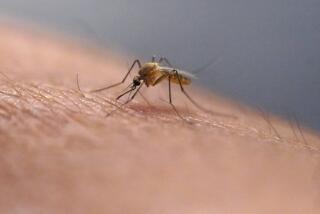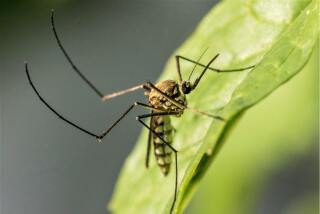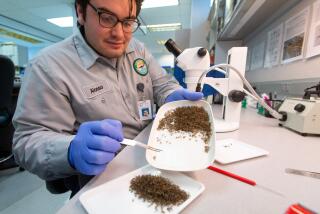Meningitis deaths bring warning for gay men
Three gay men who contracted meningitis have died of the disease, officials said Thursday, heightening calls in West Hollywood and beyond that people get vaccinated.
The Los Angeles County Department of Public Health began providing free vaccinations for patients without health insurance Thursday. It recommended that gay and bisexual men receive the vaccination.
The department announced earlier this week that there have been eight cases of invasive meningococcal disease in the county so far this year. Of those, four cases occurred in men who have sex with men. Officials said Thursday that three of them died and that the victims were ages 27 or 28.
The department said some of those infected men lived or socialized in the West Hollywood and North Hollywood areas but were not more specific.
Dr. Robert Bolan, the medical director at the L.A. Gay & Lesbian Center, said there is cause for concern in the gay community because the infection rate is higher in men who have sex with men and especially in those who are HIV-positive.
Bolan said it is unclear why the disease seems to affect gay men specifically, though the weakened immune systems of people who are HIV-positive might make them more susceptible.
Of the four Los Angeles County cases reported among gay men, three involved men who were HIV-positive, county health officials said.
“I think the important thing to understand is this is not an epidemic,” Bolan said. “But there’s a pretty strong signal that men who have sex with men, at least those who are HIV-positive, are at increased risk for invasive meningococcal disease.”
The deaths come less than a year after Los Angeles’ gay community grappled with another meningitis scare.
Brett Shaad, 33, a West Hollywood resident and attorney, contracted meningitis in April 2013 after attending a gathering of gay men in Palm Springs. He died days later.
The AIDS Healthcare Foundation responded by offering free meningitis vaccinations. County health officials eventually offered them for low-income and uninsured residents.
Invasive meningococcal disease stems from a rare bacterial infection that can spread to the blood, brain or spinal cord and can affect the entire body — sometimes causing death.
It is spread by close exposure to sneezing or coughing or direct contact with saliva or nose mucus — though it’s less contagious than influenza, the health department said.
Activities associated with risk for the illness include smoking, close contact with an infected person such as kissing or sharing beverages or cigarettes, and living in group settings for prolonged periods.
Symptoms of the illness usually strike within five days of exposure to the bacteria, and may include a high fever, stiff neck, aversion to bright light and aches.
The bacterial strain most common in Los Angeles is covered by the current meningitis vaccine.
West Hollywood Councilman John Duran said he hopes more specifics emerge about the three deaths. The men died at least a week ago, and Duran said he would like to know why the county didn’t announce it sooner.
“Three deaths in three months, it’s a lot in one community,” said Duran, who is running for Los Angeles County supervisor. “It’s disproportionate to the numbers of gay men that are in the general population. It’s a bigger tragedy that they’re all young men in their 20s.... It’s like a bad dream, like a bad deja vu.”
More to Read
Sign up for Essential California
The most important California stories and recommendations in your inbox every morning.
You may occasionally receive promotional content from the Los Angeles Times.











